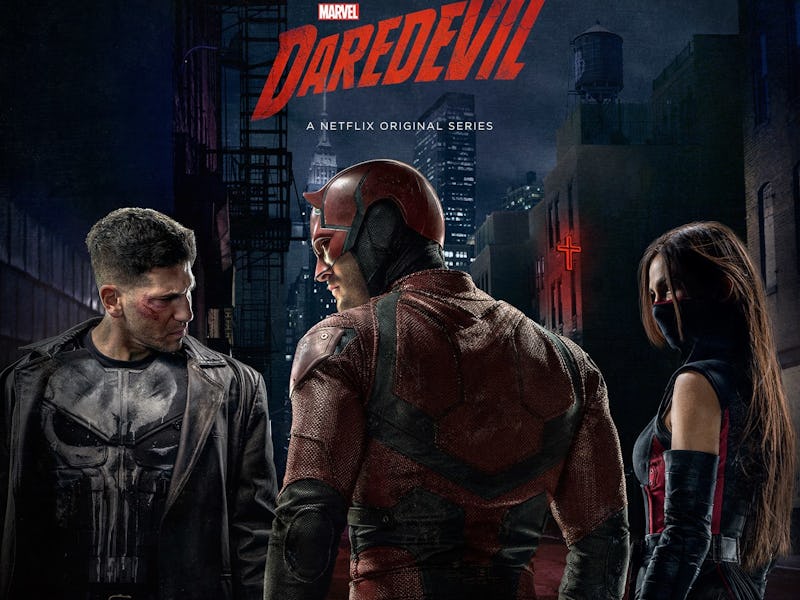The Punisher Blows Everything Up in 'Daredevil' Season 2
A fulfilling Punisher arc and an underwhelming Elektra continuation make up a better Season 2 of the Netflix-exclusive series.

“Bang.”
So starts the second season of Marvel’s hit Netflix series Daredevil, both metaphorically and literally, as said by Walking Dead alum Jon Bernthal as the unhinged, pitch-perfect Punisher in the first episode. Daredevil is a confident noir action drama that improves upon its powerful but awkward freshman year in many, but not all, ways.
In Season 2, Matt Murdock (Charlie Cox) continues his double life as a blind attorney for the broke midtown firm Nelson & Murdock and vigilante crusader by night. It isn’t long until Frank Castle, a one-man army, or “Punisher,” shoots up the city’s gangs and ignites a turf war with innocent people in the crossfire. As Murdock confronts Punisher, his old flame Elektra (Elodie Yung) seeks Matt’s help to rid Hell’s Kitchen of a mysterious order called “The Hand,” poised to take complete control of the city — and possibly the world.
If it sounds like Daredevil’s Season 2 is several separate movies strewn together, well, that’s not a bad assessment. The first eight episodes are cleanly broken into separate arcs devoted to Daredevil’s new adversaries and allies. Those episodes feel like Daredevil is its own mini-universe of movies, not a season of television. Binge-watching is in vogue and Netflix expects you to devour this in one weekend. But since Daredevil paces itself out, the all-in-one-sitting approach is not actually the best way to consume this particular season.
“You hit ‘em and they get back up. I hit ‘em and they stay down.”
The first four episodes pit Murdock against Bernthal’s exceptional and scary Punisher. These episodes feel most like a summer movie, when Daredevil fights against — and then warily unites with — the Punisher. The series’ show-stopping set pieces, like the one-take hallway fight Season 1 wowed with last year, expands with video game-like variables down a staircase with more grunts to dropkick and physical handicaps.
These episodes are also where Daredevil finally addresses the problem of Daredevil: He’s a vigilante. Right or wrong, Murdock is breaking the law with his heroism, and it takes an impassioned tête-à-tête with Punisher to remind Murdock of the line he can never cross. A jaded viewer can see their rooftop exchange that emulates Garth Ennis as the “We’re not so different” speech from every James Bond movie. But this is the first instance in all the Marvel Cinematic Universe that approaches this question — in the way Iron Man nor the Agents of S.H.I.E.L.D. are qualified to ask. In a galaxy of aliens and gods, it’s absolutely refreshing to see Marvel heroes finally question their merits at street level.
With a a near identical ending to The Dark Knight and a rain-soaked romantic beat with Matt and Karen, the first four hours of Daredevil Season 2 feels like a four-hour superhero movie on a smaller scale. Its gritty aesthetics and rich atmosphere make up for the long time you’re engaged, but by the time Matt resigns himself to his house in Episode 4, it’s time to hit pause.
Go outside. Get a drink. Then come back. Because that’s when Elektra shows up.
“Hello, Matthew.”
From out of nowhere, Elodie Yung joins Daredevil as the fan-favorite Elektra to complicate everything. A well-traveled warrior who isn’t being honest about her loyalties, Elektra is an old flame who seeks Matt’s help in ridding the neighborhood of the Japanese Yakuza. But with Punisher apprehended and the criminal case of the century underway, episodes five to eight of Daredevil turn the show into a tonally dissonant martial arts epic/legal drama that whiplashes with ninjas and courtrooms. The ill-timed rise of the Hand, an ancient order on the verge of controlling the city, and soon the world, makes Matt’s life a living hell.
Though the latter episodes sport more action and character tension than the, there’s a missing element that made the first four episodes fulfilling. Maybe it’s the visual, almost comical dissonance of ninjas juxtaposed with court scenes that belong on The Wire, or maybe it’s the additional character that diverts momentum, or maybe it’s the legalese that can get annoying to follow, but episodes five through eight aren’t Daredevil’s strongest. The filmmaking is less inventive and fun, almost every fight scene is shot in literal darkness, and the ham-fisted tension between Matt and his friends feels quick and unspectacular.
“Your work is not yet finished.”
Some things have changed since we last explored Hell’s Kitchen through Murdock’s eyes. New showrunners Doug Petrie and Marc Ramirez, taking over from Steven S. DeKnight, show a lot of confidence in their willingness to go full speed ahead right from the start. And for a while it doesn’t look like they’re even capable of slowing down. But eventually they do, and it isn’t Daredevil’s finest hour.
After Christopher Nolan’s The Dark Knight Rises, dark, realistic superheroes became hard to execute, because you couldn’t really top what Nolan did. Brighter flicks like The Avengers and Guardians of the Galaxy felt like the proper form for modern interpretations of Golden and Silver Age heroes, and anything that retained dark aesthetics — Zack Snyder’s Man of Steel, Marc Webb’s The Amazing Spider-Man — felt out of place. But then, Daredevil happened.
In its first season, the show had to contend with being an origin story. While it didn’t have predictable beats like the first time a blind Matt put on his gear in some pseudo-profound way, it did have to explain his motivations against crime (the murder of his boxer, blue-collar dad) and his downright impossible training with Stick (Scott Glenn, who reprises his role in Season 2). With that out of the way, Daredevil wastes no time getting into the action, starting with Murdock in full Daredevil glory and the show only tries to go up from there. It only barely keeps up.